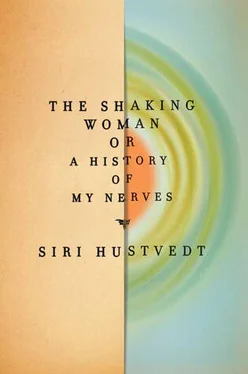In the first case reported by Hitomi, the patient and therapist were able to use a doll as a transitional self-object between them to play with forms of her broken identity. In the second, the patient used the therapist as a mirror that would gradually reflect back himself. In both cases, doubling offered an avenue to healing. Alienation into another representative thing (the doll) or person (the therapist) helped restore the “self.”
DURING THE LAST WEEK I spent with my father before he died, my mother and I followed a routine. We would often arrive in the afternoon to visit him because that was the time of day when he had more strength for talking. We left him in the evenings, after my mother helped him prepare for bed — performing the rituals of teeth brushing, moisturizing his dry skin, and making sure his pillows, sheets, and blanket were comfortably arranged. Then my mother and I would say good night to him, drive home, and usually go quickly to sleep. I think we were both emotionally exhausted, although we rarely mentioned it to each other. On one of those last nights, I crawled into the narrow, too short bed I had slept in as a child and pulled the covers over me. As I lay there, thinking of my father, I felt the oxygen line in my nostrils and its discomfort, the heaviness of my lame leg, from which a tumor had been removed years before, the pressure in my tightened lungs, and a sudden panicked helplessness that I could not move from the bed on my own but would have to call for help. For however long it lasted, only minutes, I was my father . The sensation was both overwhelming and awful. I felt the proximity of death, its inexorable pull, and I had to struggle to leap back into my own body, to find myself again.
I told my mother about my nighttime metamorphosis, and she said, “That’s never happened to me.” Of course, my mother had been taking care of my father for years as his emphysema worsened, and were she prone to such transformations, she would have been stopped in her tracks. By then, my father had given me permission to use his memoirs in the novel I was writing. When he died, I was already working on the book that was, in part, an imaginative version of his life. I had read and reread his memoir. I’d read the letters he had written to his parents when he was a soldier during the Second World War in the Pacific and, as an exercise, had typed those letters in order to feel them. Typing allowed his words to take on a physical reality beyond what I would have experienced by just reading them. My fingers can listen, too. I spent four and a half years writing the book. When I wrote the speech for the memorial, I paused from the novel, which was nearing its end, and had the strong sensation I wrote about earlier: as I planned the talk and wrote on my index cards, I felt his remembered voice. I suspect, although I cannot know, that when I opened my mouth to speak that day back home in Northfield, my identification with my father, always strong, had become even more intense. The words of the text I had written fell somewhere between us — not his, not quite mine — somewhere in the middle. One of the novel’s dominant themes is traumatic memory. For the book, I borrowed my father’s words, in which he tells about the murder of a Japanese officer, and recorded the passages he had written about his flashbacks, one in particular: a trembling fit he had as he listened to a hymn in the chapel on the St. Olaf College campus, not far from where I found myself the afternoon I shook so hard I thought I would fall down.
Here is a story. Is it a true story? It feels as if I am circling some emotional truth. It still strikes me as strange that the case histories I write should read like short stories . Freud was listening to stories. There are events, and we weave them into a narrative that makes some kind of sense. In his resonant essay “Mourning and Melancholia,” Freud distinguishes between two forms of grief. The person in mourning, he argues, has suffered a conscious loss, and it is the outside world that turns gray and meaningless for the period of grieving. In melancholia, however, the afflicted person has powerful conflicted identifications with the dead person, some of which are unconscious, and the loss becomes internal, not external — a psychic wound. 127Reading the essay again made me say to myself, Yes, there is something true here. And yet I don’t suffer from the feelings of worthlessness Freud attributes to melancholics who berate themselves fiercely and seem utterly joyless. I am not depressed. There is, however, in my mourning a blur of betweenness or a partial possession by a beloved other that is ambivalent, complex, and heavily weighted with emotions I can’t really articulate.
MY DAY: The paragraph above was the last thing I wrote after a few hours of work on a Tuesday morning, before I dashed off to have lunch at noon with a dear friend of mine, a psychiatrist and psychoanalyst. Among other things, we discussed finding me an analyst. I had decided to make the leap, and G. said he had a recommendation. When he told me this, I felt relieved. After lunch, I taught my two writing classes at the hospital as usual. In the first class, for adolescent patients, I had a single student, a sensitive, sober girl of sixteen who was also an eager writer. I’ll call her D. Although I always ask my adult students to respond to a text, usually a poem, I have found that the young people do better with a single word, an emotional word. I chose fear .D. wrote about her fear of escalators, one she had successfully conquered. I wrote about my fear of being in cars, which had slowly begun to diminish. After that, I asked her if there was another emotion she’d like to address, and she said, “Sadness.” In her essay, she wrote that she cuts herself. When she is sad, lonely, under pressure at school, or struggling with and sometimes failing tests, she cuts herself. Sadness and cutting go together. In the adult class, we read and responded to some poems by Theodore Roethke. Then I wandered around a bit in the city before I participated in a PEN event held at Cooper Union to promote the democratic cause of the monks in Burma. I took my propranolol and read aloud a short text written by a well-known Burmese comedian, Zargana, describing his brutal interrogation by the authorities after his first arrest, in 1988. He is now in prison yet again for speaking out against the military government after the devastating Nargis storm. (I did not shake.)
MY DREAM THAT NIGHT: I am wandering down corridors and rooms and find myself in a lab of some kind, a small barren place. A doctor in a white coat is standing there. He tells me I have cancer. The number 3 is somehow part of his diagnosis. The cancer is inoperable. I am dying. There is nothing to be done, he says. I wander away from the physician, and it is only then that I become intensely aware of the tumors under the skin at my throat and around my neck, bulging protuberances that move under my fingers when I touch them and that confirm my terminal state. Suddenly, I am in the backseat of a moving car behind a Buddhist monk in a saffron robe. Well, I think to myself, I’ve always known that the book I am writing wouldn’t be a long one, but now I’ll have to cut it short, end it sooner than I had expected. I’m dying. It will be the last book I write. This makes me terribly sad — not desperate, as I would have been in waking life, but unutterably, deeply sad. Then I woke up.
AS IS TRUE OF MANY DREAMS, this one collapsed my day into a curious, dense little parable. Even before I crawled out of bed, I understood that my dream tumors referred to the malignant tumor the doctors removed from my father’s thigh, which left his leg stiff and useless, the leg I had felt so intensely during my minutes of nearly complete identification with my father as I lay in my childhood bed. That my cancerous tumors were popping out of my neck reminded me of Hitomi’s schizophrenic patient who drew his therapist’s ties until he began to focus on the features of a face, first his doctor’s, then his own. The dream followed my day at the hospital, the day every week when I see psychiatrists in white coats come and go on the wards. That particular Tuesday at lunch G. had suggested a psychotherapist for me, and only hours before that, I had written about the importance of faces for recognizing and identifying other people. But the neck is also where the shaking woman begins. A sick neck served as the perfect dream image of my symptom: From the chin up, I was my familiar self. From the neck down, I was a shuddering stranger.
Читать дальше












